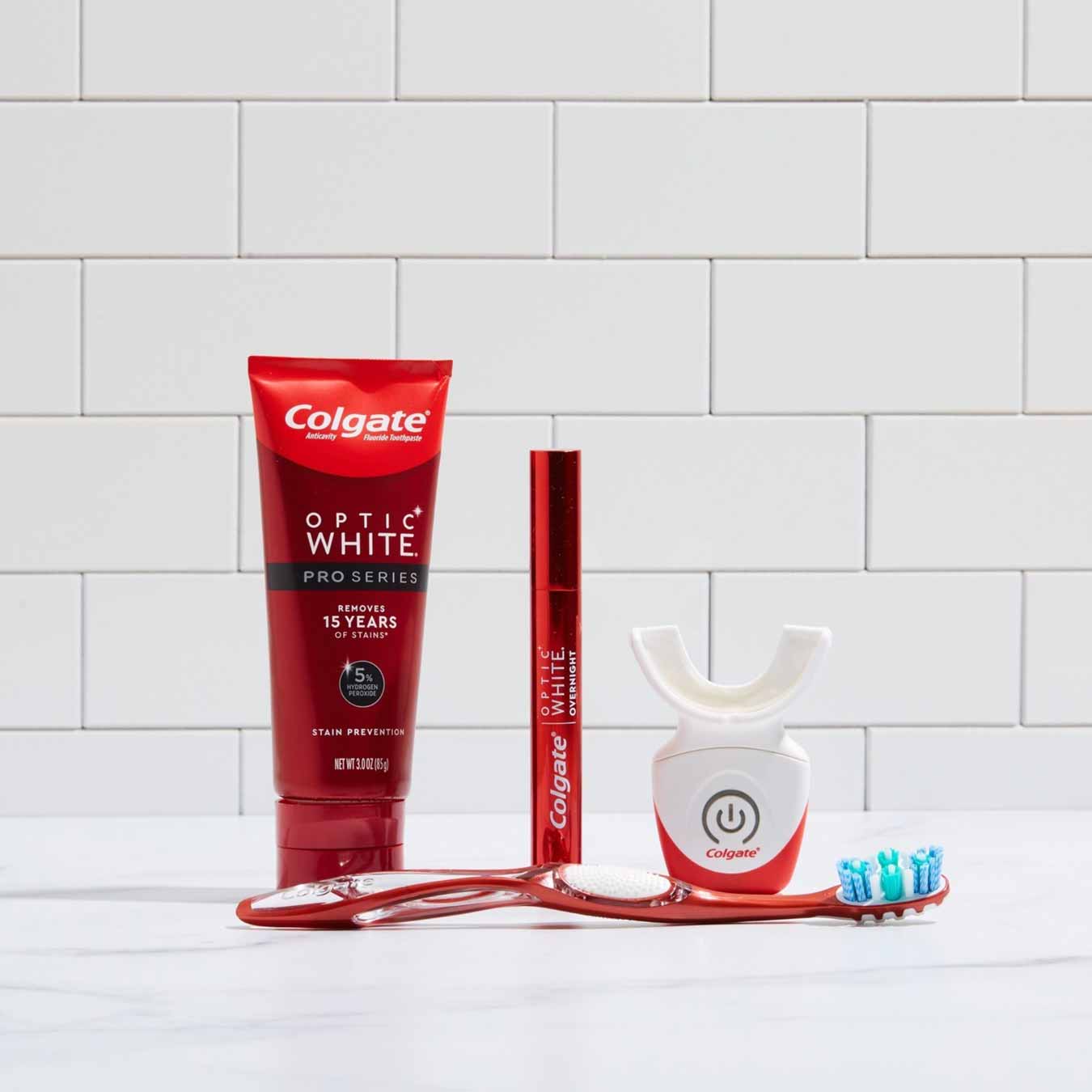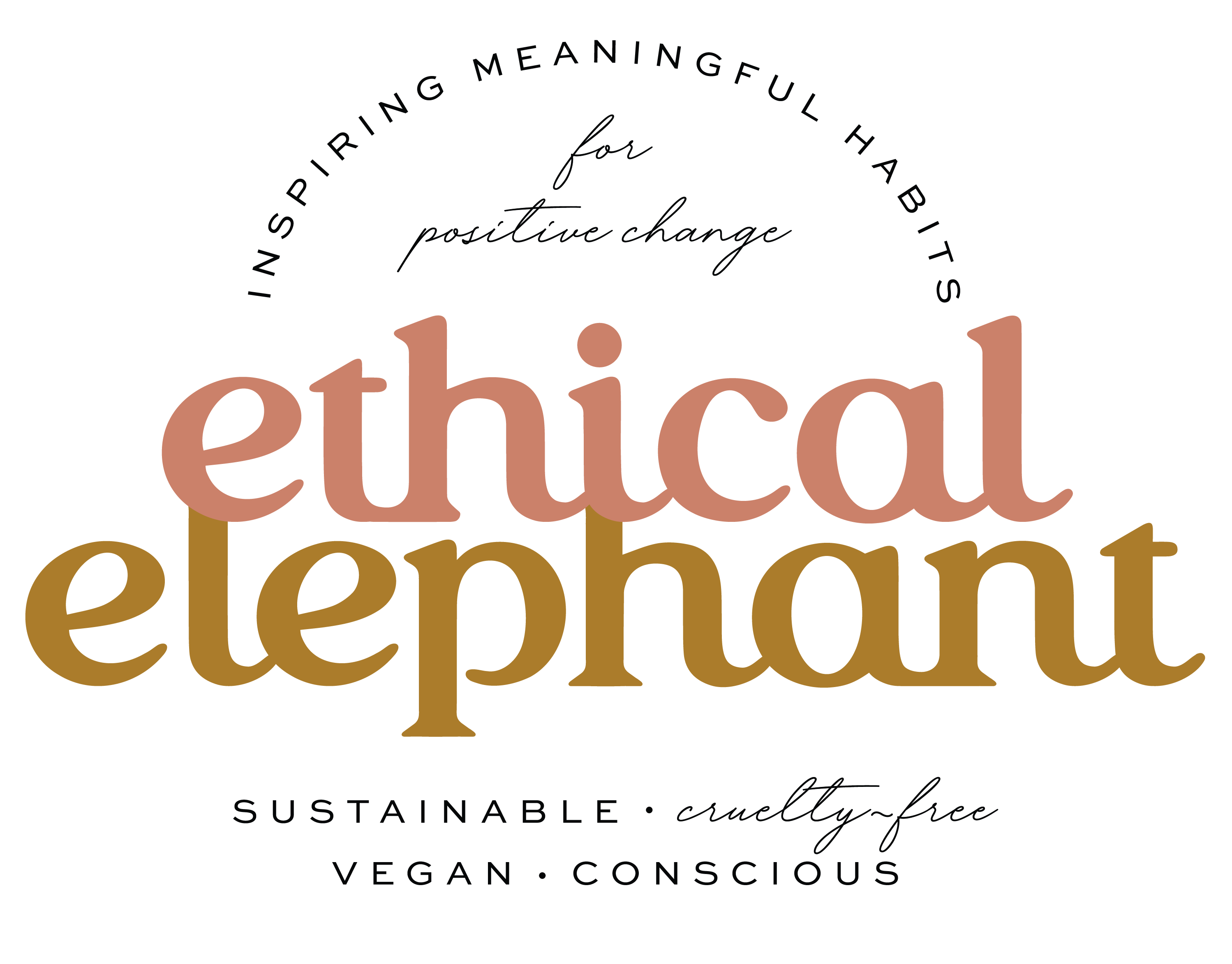This post may contain affiliate links that at no additional cost to you, I may earn a small commission.
Is Colgate Cruelty-Free?
☠️ Colgate is NOT cruelty-free in 2023. Colgate allows its products to be tested on animals when required by law.
Colgate’s Animal Testing Policy
When asking, does Colgate test on animals? We must look beyond to ensure none of Colgate’s ingredients or suppliers test on animals. And they don’t sell in any country or under conditions that may require animal testing by law.
To assess whether brands are cruelty-free, I always start with the company’s official animal testing policy on its website.
On Colgate’s website, they claim the company, Colgate, has not conducted animal tests on its oral care products since 2016 and whenever possible, uses existing data to ensure the safety of its products without the use of animals for testing. And then provides a link to its parent company, Colgate-Palmolive’s product safety research policy.
See below for a screenshot of what’s currently stated on Colgate’s website:
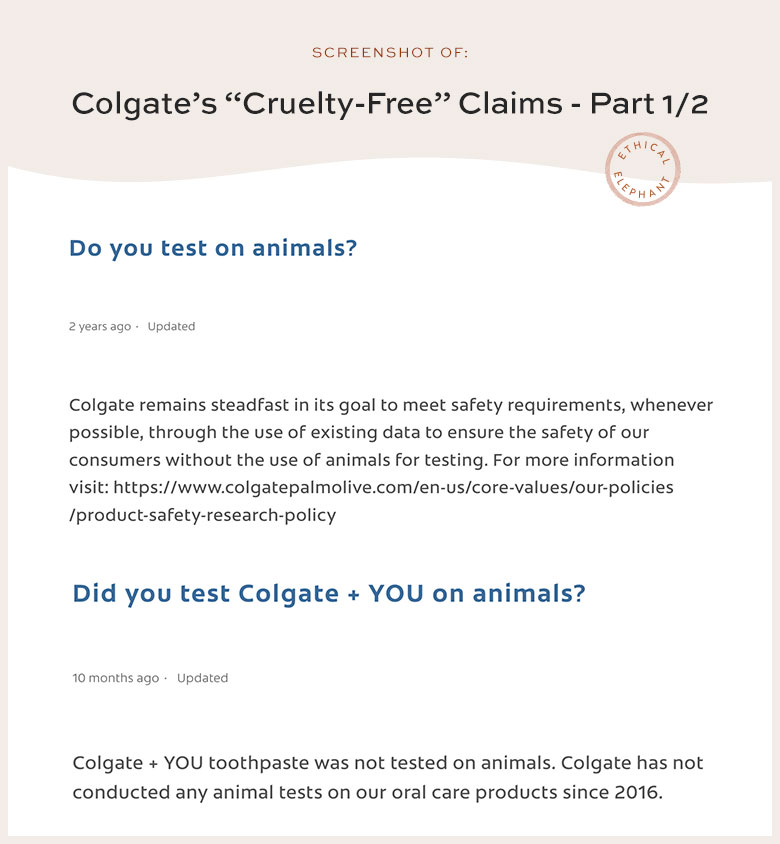
Colgate’s claims that their oral care products have not been tested on animals since 2016 is not enough information for us to classify Colgate or any other brand as being cruelty-free according to our standards.
That’s because animal testing for cosmetics can happen at various stages of product development, including at the ingredient level, and is often done by others and not the cosmetic company itself.
This is why we always assess a company’s cruelty-free policy using our Cruelty-Free Checklist. This ensures no animal testing was performed by the brand, its suppliers, or any third parties.
So I reached out to Colgate to ask for more information about their animal testing policy. More specifically, I wanted to know if they commission or allow others to test, not just their finished products but their ingredients on animals, including when selling in countries that require animal testing (like mainland China).
“Thank you for taking the time to share your thoughts about the use of animals in product safety testing. Colgate-Palmolive has a longstanding worldwide policy to minimize and to ultimately eliminate animal testing for all consumer products.
Central to this commitment are our over 35-year long efforts to encourage the development of alternatives that are scientifically valid and can be accepted by safety regulators. We are leaders in promoting, encouraging and participating in the development, validation and acceptance of alternative non-animal testing methods worldwide, investing over a million dollars annually on research with non-animal alternatives. We work closely with worldwide regulatory agencies to examine how non-animal tests can be incorporated into their safety requirements for consumer products.
Because of our commitment to conduct as few tests on animals as possible and our transparent efforts to diligently advocate to eliminate the tests still required by the government, People for the Ethical Treatment of Animals (PETA) has recognized Colgate-Palmolive as a company “Working for Regulatory Change.” You can read more about this here: http://www.mediapeta.com/peta/PDF/companies-working-for-regulatory-change.pdf
We also continue our commitment to finding and using alternative methods through support and involvement with the European Partnership for Alternative to Animals (EPAA) and the Institute for In Vitro Science (IIVS). Additionally, we support the Johns Hopkins Center for Alternatives to Animal Testing (CAAT). Colgate actively shares its work to reduce animal use and develop alternatives, so that this information can help others in their search for ways to minimize animal use.
Globally there are circumstances when regulatory agencies require animal testing. In such limited instances, the tests are conducted only at contract testing facilities that meet both government standards and the more rigorous requirements established by Colgate with input from animal welfare groups.
In 2016, 2017, and 2018, no animal tests were conducted. We look forward to a day when all necessary safety studies can be performed without the use of animals and we will continue to work to make that day come sooner.
For more detailed information on this important topic, we hope you will visit our website at https://www.colgatepalmolive.com/en-us/core-values/our-policies/product-safety-research-policy.”
Based on the response I received from Colgate, the company admits to allowing its products to be tested on animals when regulatory agencies require animal testing.
This is also confirmed by Colgate-Palmolive’s official animal testing policy on it website. See below for a screenshot of what’s currently stated on Colgate-Palmolive’s corporate website:
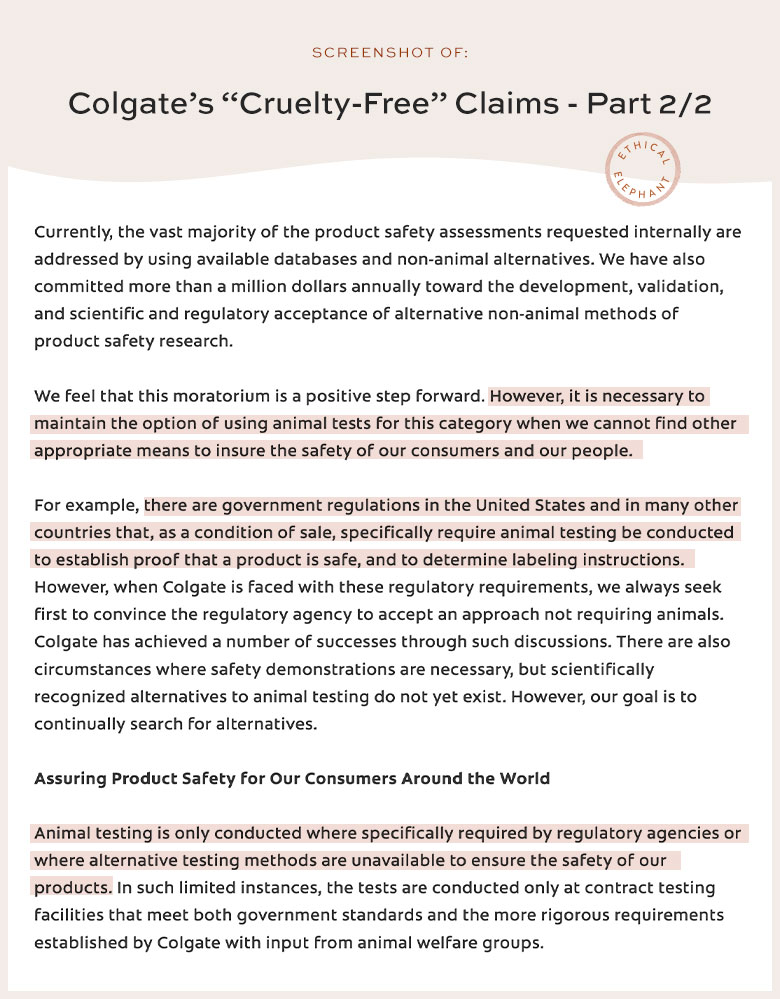
Truly cruelty-free brands will never allow their products or ingredients to be tested on animals. Cruelty-free companies have a policy where if the law requires them to test on animals then they will refuse to sell their products under those conditions.
For example, some imported cosmetics sold in stores in mainland China are required by Chinese laws to be tested on animals upon registration. Therefore, truly cruelty-free brands have chosen not to sell in China in order to remain committed to their no animal testing policy.
Unfortunately, Colgate state they will allow their products and ingredients to be tested on animals if the law requires it. For those reasons, Colgate is NOT cruelty-free.
☕️ Every week, I continue to reach out to new brands while trying my best to keep current brands updated. If you found any of my posts or guides helpful, consider Buying Me A Coffee! I would greatly appreciate it! ❤️
Cruelty-Free Policies
At ethical elephant, we always assess a company’s cruelty-free policy using our Cruelty-Free Checklist. This ensures no animal testing was performed by the brand itself, its suppliers, or by any third parties, including when required by law.
See below for our complete cruelty-free checklist. Since Colgate allows its products or ingredients to be tested on animals when required by law, we cannot classify the brand as being cruelty-free.
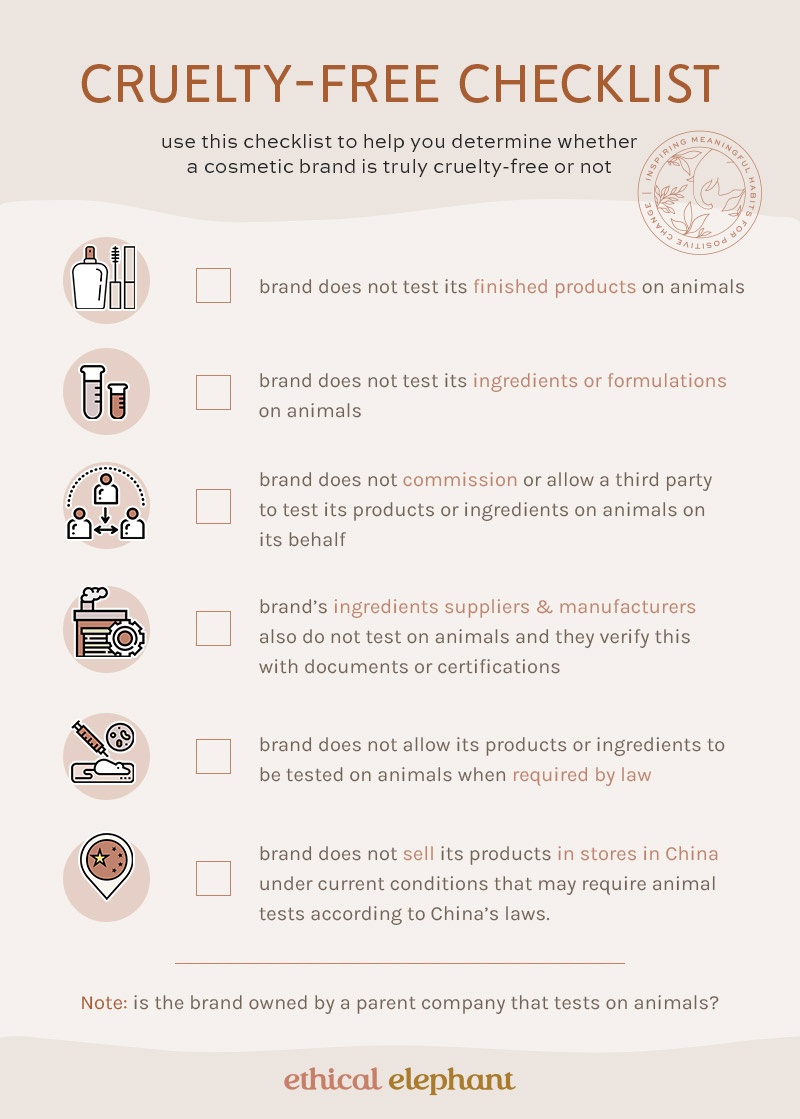
Is Colgate Certified Cruelty-Free?
Colgate is not certified cruelty-free by any third-party cruelty-free certifications like Leaping Bunny or PETA.
Since Colgate is not certified cruelty-free by a third party, no one is substantiating or auditing Colgate’s cruelty-free commitments and claims.
Is Colgate Owned By A Non-Cruelty-Free Parent Company?
Yes. Colgate is owned by Colgate-Palmolive, a parent corporation that still engages in animal testing in 2023.
Some cruelty-free consumers may choose to purchase and support cruelty-free brands owned by animal-tested parent corporations as they hope it will convince the parent company to become cruelty-free.
But in this case, Colgate is NOT cruelty-free, and neither is its parent corporation, Colgate-Palmolive.
Does Colgate Test on Animals?
To wrap up, Colgate allows its products to be tested on animals when required by law. Therefore, we would NOT consider Colgate to be a cruelty-free brand.
Currently, Colgate is on our List of Brands to Avoid – Animal Tested.
Is Colgate Vegan?
❌ Colgate is NOT vegan. Colgate claims to offer some “vegan” options that are free of animal-derived ingredients, but Colgate engages in animal testing in some capacity, so we wouldn’t consider any Colgate products vegan at this time.
In order for products to be considered vegan by ethical elephant’s standards, the products and their ingredients must not be tested on animals anywhere in the world. Also, they must not contain any animal-derived ingredients or by-products.
Cruelty-Free Alternatives to Colgate
Looking to switch to cruelty-free products? Here are some cruelty-free brands to check out:
Or check out our Guide to Cruety-Free & Vegan Toothpaste!






